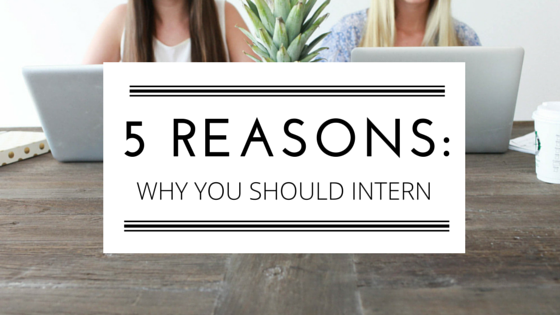Hey there, it's Robyn! One of the greatest things about living in Washington, D.C., in addition to the close proximity to some of the best museums and monuments, is that there’s never a shortage of opportunities; from working on the Hill, volunteering at a non-profit, to helping out at a startup, there's something for everyone. That was an enticing reason alone for deciding to go to school just steps away from the White House. I knew that in today’s job market it was critical to get experience while still in school, for the sake of both my resume and my own personal insight. That’s why I decided to take my first official paid internship position at the Niche Movement this summer. Despite only having worked with the team for a few weeks, I’ve already gained plenty of valuable knowledge and experience, which brings me to the point of this post.
If you're in college, doing an internship is an incredibly valuable opportunity. Maybe you’ve been debating between working at a local restaurant and getting an internship. Perhaps you’ve been eyeing a pretty cool position in your city but for some reason have hesitated to send in your application. I’ve learned from both my own experience and others’ stories that interning is an absolute must-do, especially if you’re in college. Here are my top 5 reasons for why you should do an internship:
1. It helps you figure out what career you want to pursue.
Internships are one of the best, quickest ways to learn in-depth about a career field. While school is incredibly valuable, that's something you can’t do by simply sitting in a classroom. Perhaps you've gotten an internship at J.P. Morgan, based on the idea that you'd like to go into investment banking, but soon discover that you hate everything that comes with a job in that field. After interning at a local startup company, you may realize that entrepreneurship and technology better align with your passions and talents. Just like taking classes in different disciplines, interning in varying career fields helps reveal your true interests. More importantly, it allows you to cross off careers and jobs that you've realized might not be for you after all.
2. It looks good on your resume.
I'm going to be honest, one of the reasons why I decided to finally take the plunge and start interning this summer was to make my resume more appealing. According to a study by Southwestern University in Texas, students who completed at least one internship during their time in college were 13 percent more likely to obtain a full-time employment than those who did not. The truth is that an increasing number of seemingly “entry level” jobs require a couple of years of experience, which is why it's a good idea to start raising that experience meter early on. And there's no better way to do that than having an internship. While most students seem to intern in their junior and senior years of college, it doesn't hurt to start working during the first two years of college. Some companies even hire highly-qualified high schoolers! Starting early will also help open up more options come graduation in terms of job opportunities, cool companies to work at, and places to live in.
3. It’s an excuse to live in a new city.
Although I live in DC to go to college for most of the year, going to work here is a far different experience from going to school here. Within the last month I've already seen so much more of the city than I did in the past year. I've also gotten much friendlier with the metro system, in addition to becoming more comfortable with visiting new places alone and exploring different neighborhoods. I'm looking forward to interning in either New York or San Francisco (or maybe even a different country!) before I graduate.
4. It teaches you new things about yourself.
Some of the most helpful things I’ve learned in the past few weeks include my strengths and weaknesses, as well as my career-related likes and dislikes. I’ve learned that I love creating visual content, whether it’s quote cards or other images to put out on social media. On the other hand, I don’t love doing social engagement as much, which means going on Twitter and Facebook. This whole process of learning little facts about myself on the way is, in my opinion, the most powerful aspect of interning. Similarly to what I said in Reason #2, I’m able to save myself time and energy working jobs I might not enjoy in the future to instead focus on projects I’m passionate about.
5. It’s a fantastic way to meet people.
From your boss and fellow interns, to other employees, you'll meet people that you wouldn't have otherwise crossed paths with through your internship. And you don't have to limit meeting new people to the workplace. There's always events, conferences, informational interviews, and tons of other networking opportunities you can find on places like Eventbrite, Creative Mornings, and Meetup. I actually recently attended a workshop in DC through General Assembly, and ended up meeting an industry leader who I'm sure will be a great mentor for me into the future!










